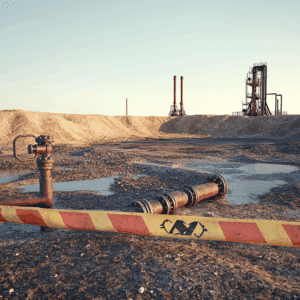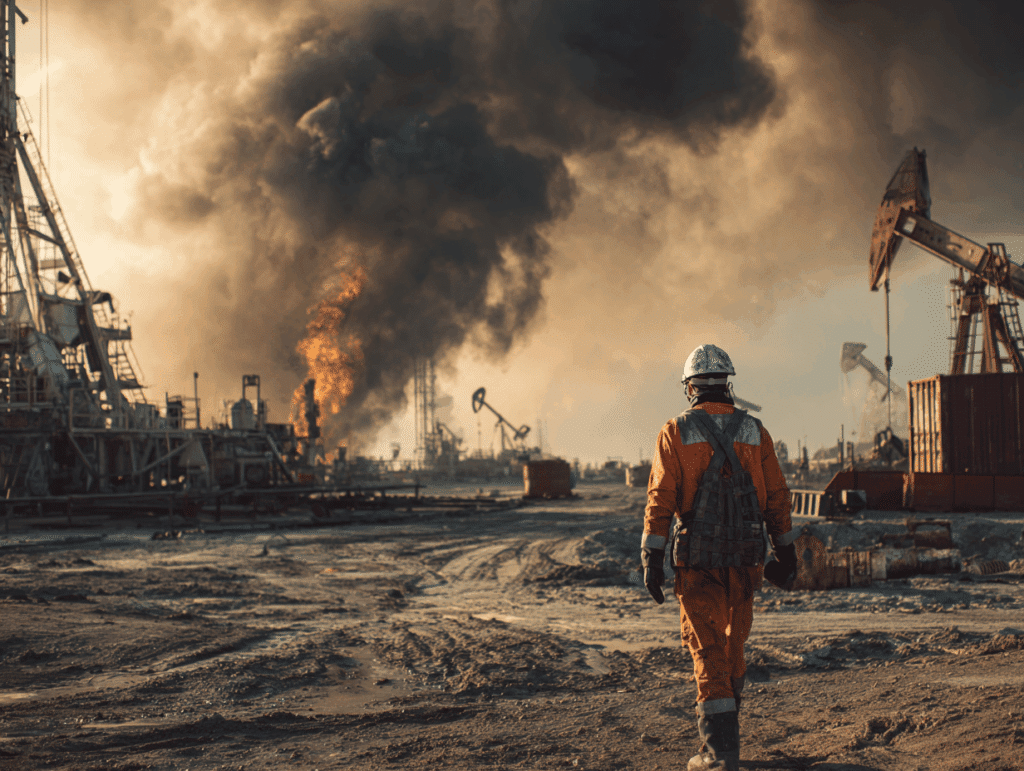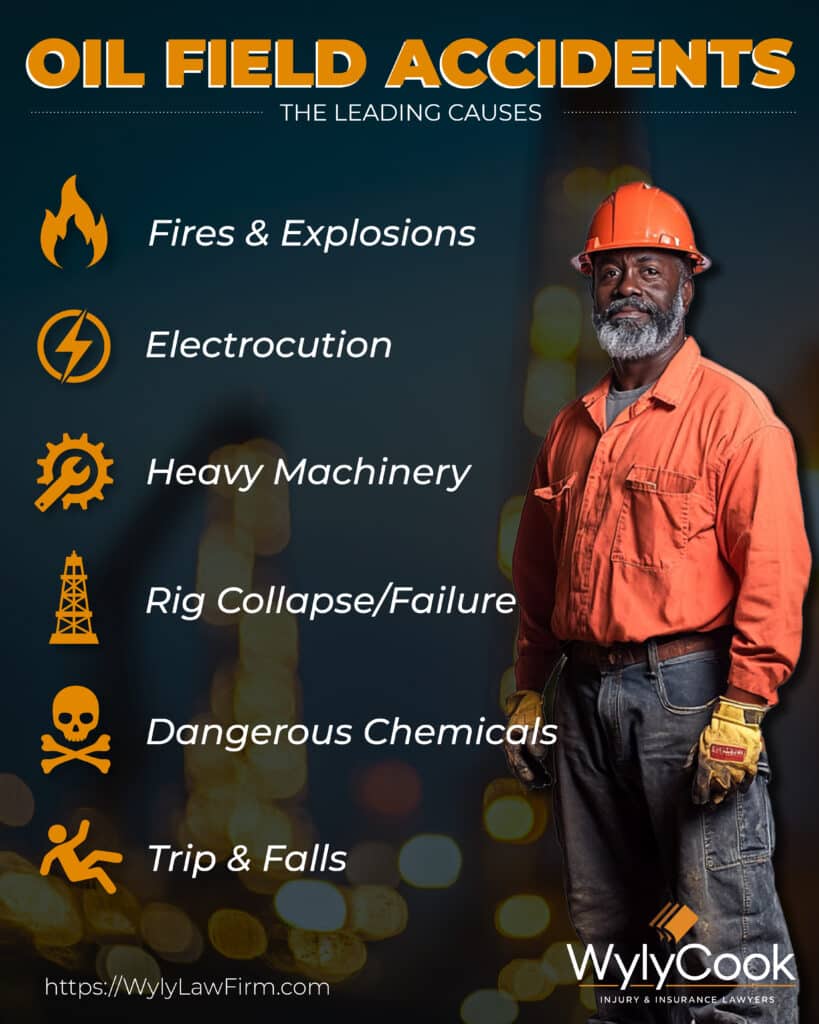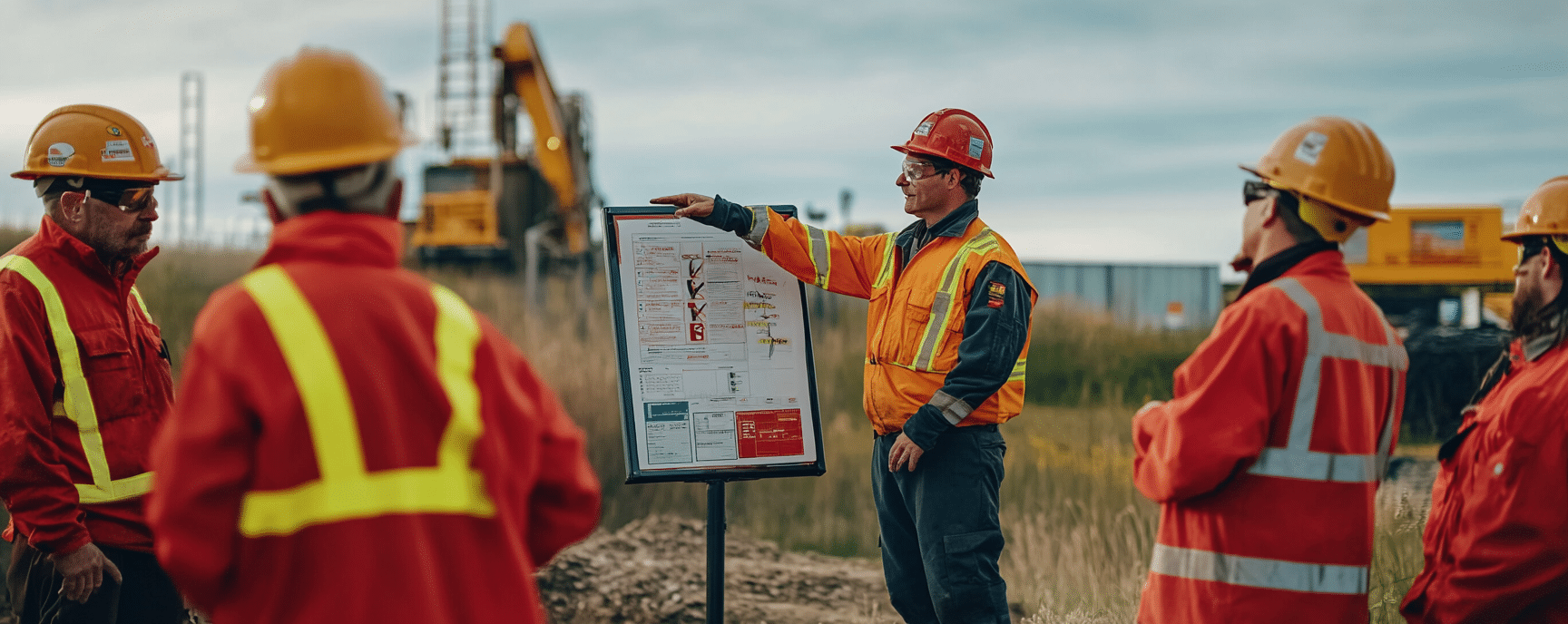Key Takeaways
- Transportation incidents are the leading cause of fatalities in the oil and gas industry, underscoring the need for enhanced safety protocols.
- Human error, inadequate safety measures, and poor command structures are significant factors contributing to oilfield accidents, necessitating effective prevention strategies.
- Ongoing training and robust safety programs are essential for minimizing risks and ensuring the well-being of oilfield workers.
Let's Go Beyond, to Bring You Back
Let's get you the compensation you're entitled to. Get a FREE Consultation today.
Let's Go Beyond, to Bring You Back
You deserve the compensation you’re entitled to, call for your FREE Case Review today.
Common Types of Oil Field Accidents
Oilfield workers and rig workers, including gas extraction workers, face numerous risks daily, ranging from transportation accidents to equipment failures and hazardous chemical exposure, as local authorities strive to implement safety regulations. These accidents not only affect the workers but also have far-reaching impacts on their families and communities.
Recognizing these accidents is crucial for fostering a safer working environment in oil and gas operations.
Transportation Accidents in Oil Fields
Transportation accidents are a significant concern in the oil and gas industry, often leading to severe injuries or fatalities. The vast distances between sites and the long commutes on private lands with relaxed traffic guidelines significantly increase the risk of motor vehicle accidents. Approximately 50 percent of these accidents involve pickup trucks, making them a significant cause of multi-fatality events in oilfields.
The statistics are grim: between 2014 and 2019, vehicle crashes accounted for 26.8% of deaths in the oil and gas industry. In 2023 alone, transportation incidents posed the highest risk, with 246 fatalities statewide across various sectors. Such accidents often result from collisions, mishaps with heavy machinery, and extended road time for workers, highlighting the need for stringent safety measures to protect oilfield workers.
Equipment Failures and Explosions

Crushing accidents, another common equipment-related incident, can lead to complex fractures, amputations, and permanent nerve damage.
Traumatic brain injuries and spinal cord damage are also frequent, resulting from falls and being struck by heavy equipment or materials.
Regular equipment maintenance and strict adherence to safety guidelines are vital in preventing these oilfield accidents.
Hazardous Chemical Exposure
Oilfield workers are often exposed to hazardous chemicals, operating in high-pressure environments around heavy equipment and explosive materials. Common injuries from chemical exposure include burns, fractures, sprains, and respiratory issues. The types of chemicals involved, such as nitrogen oxides, sulfur dioxide, and benzene, can result in serious injury or death if proper safety measures are not in place.
Unique hazards in confined spaces, like sudden chemical leaks leading to suffocation and gas leaks, pose significant risks to workers. Employers must monitor air quality by testing it before sending workers into these spaces and continually throughout their workday to ensure safety.
Supplying personal protective equipment (PPE) and training workers on its use are key steps in reducing the risks of chemical exposure.
Primary Causes Behind Oil Field Accidents
Identifying the primary causes of oilfield accidents is essential for creating effective prevention strategies. Human error, inadequate safety measures, and poor command structure are major contributors. Addressing these factors can notably reduce accidents in the oil and gas industry.
Human Error and Fatigue
Human error is a major factor in many oilfield accidents, often exacerbated by fatigue from long working hours and demanding job schedules. Fatigue among drivers is a significant contributor to transportation accidents, increasing the likelihood of mistakes on the job.
Adequate rest periods and monitoring worker fatigue can help mitigate these risks.
Inadequate Safety Measures
Inadequate safety measures often lead to severe injuries and fatalities. Falls from elevated rigs are common due to insufficient safety protocols. Significant oil rig disasters, such as the Deepwater Horizon incident, are often linked to failures in safety measures, emergency response, and communication protocols.
Tailored risk assessments and comprehensive safety programs are necessary to protect workers.
Poor Command Structure
A poor command structure can prevent timely and effective responses during emergencies, leading to catastrophic incidents. The Alexander L. Kielland disaster is a prime example where poor command structure prevented a timely escape, resulting in significant loss of life.
A robust command structure enhances situational awareness and decision-making, significantly reducing offshore drilling accidents.
Oil Field Accident Lawyer
Get Compensated For Your Injuries & Damages! Call Us For A FREE Case Review And Know What Your Case Is Worth.
The Role of Texas in Oil Production and Worker Fatalities
Texas plays a pivotal role in the U.S. oil production industry, contributing significantly to the national supply. However, this comes with a high cost, as Texas oil and gas workers face a fatality rate seven times higher than the national average for all industries.
This elevated risk highlights serious safety concerns that need addressing.
Texas Oil Production Statistics
Texas contributes about 42% of the total oil production in the United States, with nearly 2 billion barrels produced annually in the Permian Basin. This substantial production significantly impacts the local economy, fostering job creation and economic growth.
However, the high production levels also mean increased risks for oilfield workers.
Elevated Fatality Rates in Texas
Texas has the highest number of oilfield worker fatalities in the U.S., with 36 fatalities in the oil and gas extraction sector in 2023 alone. From 2014 to 2019, there were 219 fatalities reported in Texas from oil and gas worker incidents. Leading causes include vehicle crashes, being struck by objects, explosions, falls, and exposure to harmful substances.
Legal Rights and Compensation for Injured Oil Workers
Injured oilfield workers have the legal right to pursue compensation for medical expenses, lost income, and emotional distress related to oilfield injuries. Knowing the available compensation options is critical for these workers.
There are three main avenues: workers’ compensation benefits, nonsubscriber claims, and third-party claims.
Workers’ Compensation Benefits
Workers’ compensation benefits include coverage for medical treatment, rehabilitation costs, and a percentage of lost wages. Injured workers must document their injuries and treatments to support their claims.
Workers do not need to prove employer fault to receive benefits; however, a worker cannot sue his employer for personal injury damages outside the workers’ compensation system.
Nonsubscriber Claims
Some employers elect to forgo coverage under the workers’ compensation laws. These employers are referred to as “nonsubscribers.” Unlike where the employer subscribes to workers’ compensation, an employee is permitted to sue his nonsubscribing employer for causing his injuries, and the compensation available in the suit may be much higher than would be allowed under the workers’ compensation system. But, unlike with workers’ compensation, the employee must show that the employer was negligent or otherwise responsible for the injury.
Because Texas wants to encourage employers to participate in the workers’ compensation system, the law disallows many defenses to nonsubscribing employers that would apply in other injury suits. For example, if the employer is only 1% responsible for causing an injury and the worker is 99% responsible, the employer must still pay for all the harm and losses.
Third-Party Claims
Regardless of whether they can or cannot seek workers’ compensation benefits or sue a nonsubscribing employer, oilfield workers can file third-party claims against anyone other than their employer who may be responsible for an injury, including drilling contractors or equipment manufacturers. These claims allow workers to seek compensation beyond looking to their employer, and third-party claims are not limited in damages allowed like workers’ compensation claims.
Importance of Safety Programs and Training
Effective safety programs and continuous training are paramount in the oil and gas industry to protect workers from hazards and preserve lives. A commitment to training indicates that oil and gas companies show seriousness about worker well-being and operational integrity.
Effective safety protocols cover handling machinery and emergency response plans.
Effective Safety Programs
Lack of proper training and insufficient safety regulations often lead to serious injuries in the oil industry. Ongoing training keeps employees updated on new safety protocols and occupational safety, reducing complacency risks.
Effective safety programs also require a well-structured command hierarchy for quick decision-making during emergencies.
Continuous Training Practices
Training should be continuous, with regular updates to ensure all workers are current on safety protocols, preventing accidents.
Effective safety initiatives are characterized by management commitment, employee involvement, and a strong safety culture, along with continuous hazard assessments.
High-Profile Oil Rig Disasters and Lessons Learned
High-profile oil rig disasters serve as stark reminders of the inherent dangers in the oil and gas industry. Studying these incidents helps understand safety protocols and the importance of stringent measures. Fires and explosions are significant incidents in these disasters, leading to devastating injuries and loss of life. Oil rigs are a critical aspect of this industry, highlighting the need for continuous improvement in safety measures.
Lessons from these events have led to greater awareness and stricter safety protocols in the industry.
The Deepwater Horizon Disaster
On April 20, 2010, the Deepwater Horizon exploded and caught fire, resulting in one of the worst environmental disasters in history. There were 126 workers on board at the time, and the blowout preventer failed, causing a massive explosion and subsequent oil spill. The Deepwater Horizon sank.
Prior to the explosion, BP engineers had observed alarming warning signs that the well might explode, which were unfortunately ignored. Many workers felt forced to sign waivers post-disaster, highlighting concerns about their treatment.
The Ocean Ranger Disaster
The Ocean Ranger disaster occurred when the mobile offshore drilling rig was hit by a rogue wave while drilling, leading to its sinking. This tragic event resulted in the loss of 84 crew members, most of whom succumbed to drowning or hypothermia.
The disaster prompted several safety reforms in the offshore drilling industry, emphasizing the need for better safety protocols and emergency preparedness.
Let's Go Beyond, to Bring You Back
Let's get you the compensation you're entitled to. Get a FREE Consultation today.
Let's Go Beyond, to Bring You Back
You deserve the compensation you’re entitled to, call for your FREE Case Review today.
Financial Damages Recoverable After Oil Field Accidents
After an oil field accident, injured workers can seek financial compensation for their losses. There are two main types of damages: economic and non-economic. Knowing the differences can help injured workers seek full compensation.
Economic Damages
Economic damages refer to direct financial losses, including medical costs, lost wages, and employment benefits. These damages cover verifiable financial losses, such as current and future medical expenses, rehabilitation costs, and the loss of income due to the inability to work.
Non-Economic Damages
Non-economic damages provide compensation for non-tangible losses like emotional distress, pain, suffering, and reduced quality of life. These damages address the emotional and psychological impact of injuries, ensuring that the injured worker’s overall well-being is considered.
The Benefits of Hiring Wyly & Cook
Hiring Wyly & Cook can enhance the chances of securing fair compensation for injured oil workers. Experienced legal representation is vital for navigating the complexities of these claims and maximizing compensation.
Wyly & Cook understand the legal intricacies unique to these cases and can aid in recovering additional damages for intentional or reckless safety violations.
Expertise in Oil Field Injury Cases
Wyly & Cook can navigate the complexities of oil field injury cases by understanding legal frameworks and industry standards. They gather evidence and may consult with industry, medical, or scientific experts, to ensure injured workers receive maximum compensation.
Maximizing Compensation
Wyly & Cook work diligently to secure lost wages and recover medical expenses for injured offshore workers. Having legal representation from a personal injury attorney is crucial for ensuring injured workers receive maximum compensation, as attorneys understand the complexities of filing claims.
These strategies can significantly impact the total amount of compensation workers receive, ensuring they are financially supported during recovery.
Frequently Asked Questions
What are the most common types of oil field accidents?
The most common types of oil field accidents are transportation incidents, equipment failures leading to explosions, and exposure to hazardous chemicals. These accidents highlight the importance of stringent safety measures in the industry.
How does human error contribute to oil field accidents?
Human error significantly contributes to oil field accidents, primarily due to factors like fatigue from extended working hours, which increases the likelihood of critical mistakes that can lead to severe injuries or fatalities.
What legal rights do injured oil workers have?
Injured oil workers are entitled to seek compensation for medical expenses, lost wages, and emotional distress through workers’ compensation benefits or a claim against a nonsubscribing employer, and claims against third-parties that may be responsible for the harm. It’s crucial for them to understand and assert these rights to ensure they receive the necessary support.
Why is continuous training important in the oil and gas industry?
Continuous training is crucial in the oil and gas industry as it keeps workers updated on safety protocols, thereby minimizing accidents and promoting a robust safety culture. This commitment to ongoing education is essential for both employee well-being and operational efficiency.
How can Wyly & Cook help injured oil workers?
Wyly & Cook can significantly assist injured oil workers by offering experienced legal representation that addresses the complexities of oil field injury claims, ensuring that they receive maximum compensation for both economic and non-economic damages.




